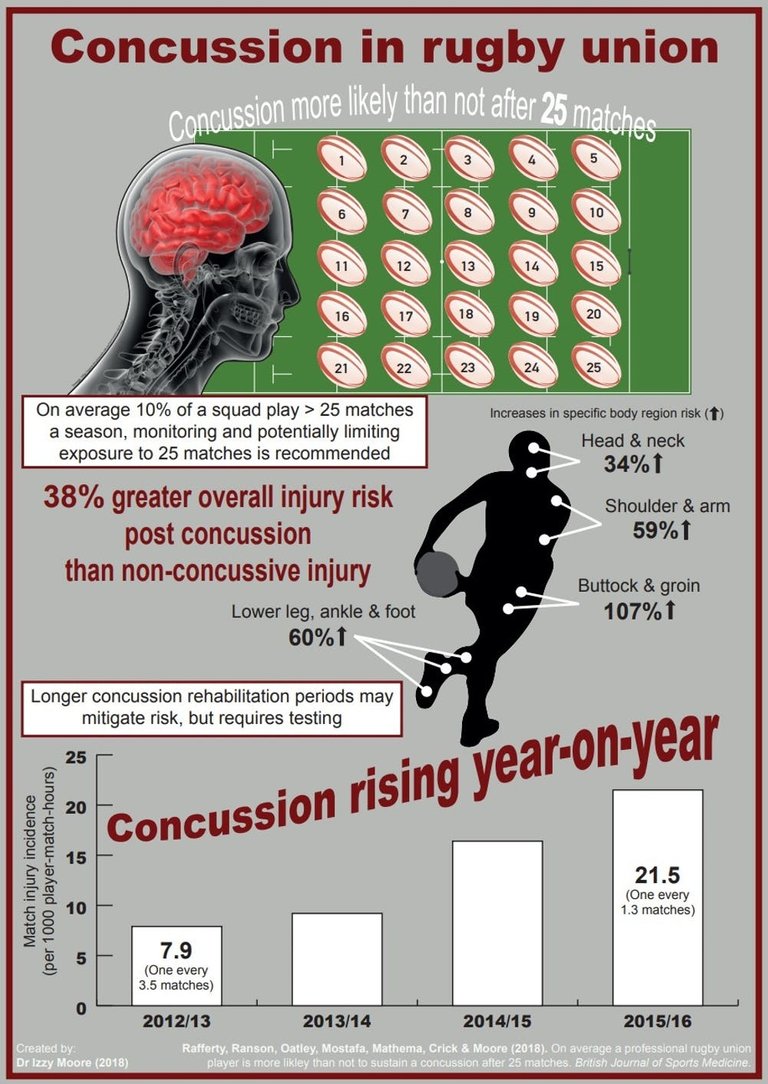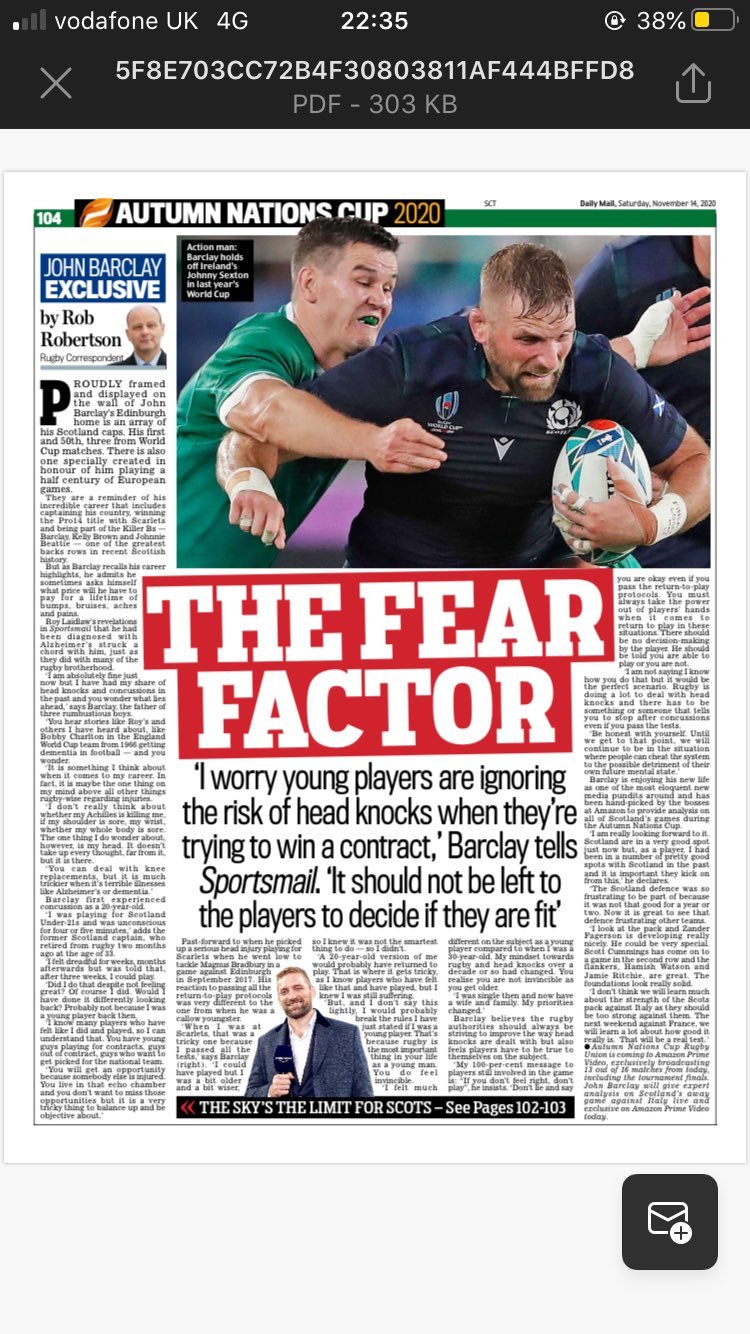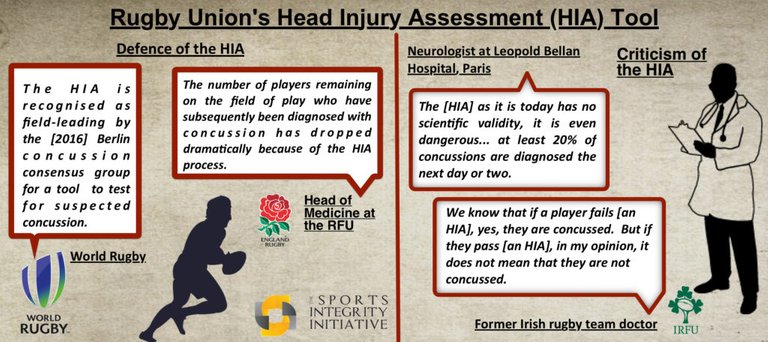HIA And Ding Dong Tests
Contact sports like Rugby and American Football have been in the spot light for the last decade or so regarding concussions and it's effects on the brain. In the days gone by and not that long ago when I played the thought was if you weren't knocked out you were golden and could continue. Even if you were knocked out and gained consciousness teams would still expect you to carry on. My experiences are with rugby Union so to be honest have no idea how many players are effected by American Football besides what I have watched on television in films and documentaries. I see World Rugby taking action by protecting their players whilst the NFL is trying to hide it.
Only now are we seeing the effects of this type of manly thinking as players have retired and are now feeling the impacts they received whilst playing. The one ex New Zealander/All Black mentioned they needed name tags for reunions as they couldn't remember everyone.

source
These figures are from 2016 and to be quite frank very little has changed as the risk is still there. Teams now pulverise the other team to break them down these days as defences have improved which will lead to more intense battles on the pitch.
Here are some recent stats that highlight how bad things really are.
2 to 6.9 concussions per 1000 player-hours for rugby union.
4.6 and 14.7 concussions per 1000 player-hours for rugby league.
Rule changes forcing the tackler to tackle lower leaving the neck and head out of bounds has helped and will hopefully lower the stats. Rugby is still a contact sport so head injuries will happen no matter what you do to make it safer. Players are fitter and bigger than ever these days and they are so used to riding a big hit that spotting head injuries is not so obvious. A player was 3 times more likely to be concussed than have any type of other injury which shows you the challenges the sport has to resolve.
I was reading a report about an ex Bath player who received roughly 30 concussions over his career and now at 40 has dementia. He played for 13 years as a professional and that is less than 3 concussions per season. When you add up all the contact sessions in practice and games these players have to play every season that isn't very much at all. a top player can play as many as 40 matches per season if you count all the league ,cup and international games. International players probably less as they are protected but a journeyman who plays club rugby in a successful team 30-40 matches per season is realistic.
This player was advised to retire on medical grounds 3 years before he hung up his boots and was never enforced by his clubs. My thinking is players should have a licence that needs to be medically passed in order to play. The risks are just too high as it is not like breaking a leg or an arm.
The Head Injury Assessments or Ding dong tests that are carried out immediately before a player can carry on were only introduced into the sport in 2015. Up until that point players who were concussed were cleared by the teams medical staff as it benefitted the team. These types of injuries were never really taken seriously as the damage was internal and wasn't visible.
If you have to go and have the HIA test then my thought is you should not be allowed back out anyway. What is the point as you have obviously taken a blow to the head so why is it ok to let the player come back on and play. Teams have replacements so make it a compulsorylaw.
More and more scientific tests are now happening with various studies being carried out. Players who receive concussions have to pass tests these days having medical staff signing off a clean bill of health. Twenty years ago if you were knocked out you were banned from playing for 10 days and why sniffing salts were given to get you back on your feet quickly.
Funny to think this lock down has probably prolonged many players careers as it has forced players to train but with no contact sessions. Players being forced to take a break from the sport is becoming more common these days especially if they receive multiple concussions over a short period of time.

source
Rugby is a professional sport so there is pressure and guaranteed players will hide injuries in order to gain a contract. Hiding a concussion is easy to do as nothing is visible. Even professional players as this is now a huge concern and could stop you from putting food on the table. This is your career and to suddenly stop it is just unthinkable.
Over the next decade we will see a long list of players being forced to retire on medical grounds. What is scary is that this is only a recent trend and you wonder how many more horror stories we will see and hear with ex players suffering from mental health issues. This is not just rugby though as from the stats I have seen Rugby League is even worse so how many players are suffering the effects of sweeping concussions under the carpet?
